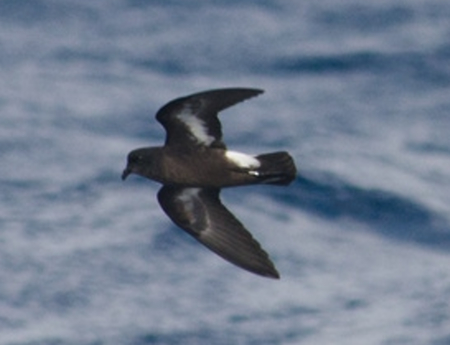Hydrobates pelagicus melitensis
Family: Hydrobatidae
Length: 14 – 17 cm
Wingspan: 37 – 41 cm
Weight: 20 – 38 g

Identification
Appearance: small black bird with a white rump (lower back) and underwing bar, black webbed-feet and beak (with external nostrils).
Distinguishing characteristics: white strip on the lower side of the wing.
Flight: erratic, fluttering, close to the water surface.
Sound: silent at sea. In colony: long « arrr-r-r-r-r-r-r… » buzzing sound and then stops with an abrupt « chikka ». During nuptial flights: piercing « terr-CHICK » sounds.
Ecology and habitat
Nest: refuge under rocks, burrows or hole on rocky islands and islets.
Diet: mainly small fish; shrimps.
Behaviour at sea: seats on the water with wings open, picking food from the sea surface. Usually solitary but can group with other storm petrels.
* This map indicates coastal nesting sites in the Mediterranean and adjacent Seas.
Distribution and movement
Breeding: three main populations in Malta, Sicily and Balearic Islands.
Wintering: majority stays in the Mediterranean basin (some reported in Portugal).
Phenology: mating: April. Laying: April/June; one single egg. Hatching: mid-June/mid-August after six week of incubation. Fledging: August/October, when chick is ten week old.
Conservation
Global population estimate: Mediterranean population: 10,969 – 16,079 breeding pairs. Suspected to be declining.
Threats: predation by invasive mammals and gulls, loss and degradation of the breeding habitats, light and noise pollution.
Protection level: Barcelona Convention : Annex II; Bern Convention : Annex II; Birds Directive : Annex I; IUCN Red List: Least Concern.
Some key references
Albores‐Barajas et al. (2011) Diet and diving behaviour of European storm petrels Hydrobates pelagicus in the Mediterranean (ssp. melitensis). Bird Study 58(2): 208-212.
Albores-Barajas YV et al. (2012) Night surveys and smell, a mixed method to detect colonies of storm petrel Hydrobates pelagicus. Avocetta 36: 95-96.
Mante A & Debize E. (2012) Mediterranean Storm Petrel Hydrobates pelagicus melitensis – Updated state of knowledge & conservation of the nesting populations of the Mediterranean Small Island. Initiative PIM. 20p.
